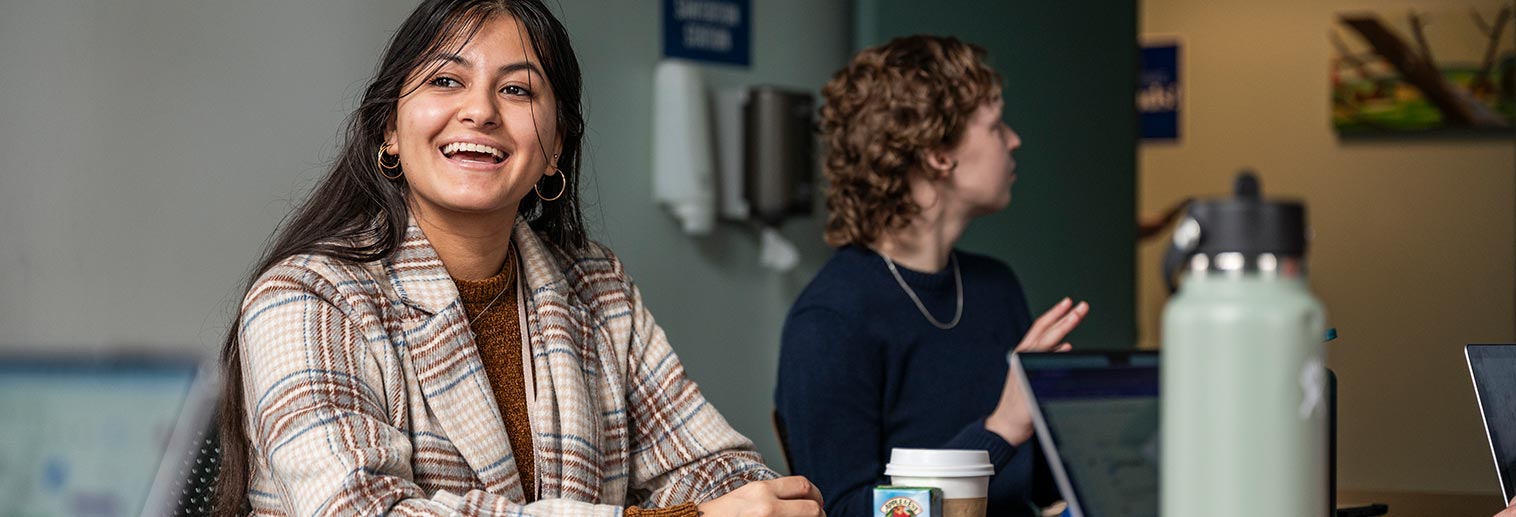Master of Social Work
Social work is one of the fastest growing professions with an increasing need for masters-level social workers in the clinical, advocacy, and policy arenas. MSW students benefit from the interdisciplinary focus of the School of Behavioral & Community Health, collaborating with students and faculty from the College of Health. Through a blended curricular structure of online, asynchronous classes, and three weekend residencies per semester, students will gain the benefit of accessible education and hands-on experience.
Applications open for 2026!
Summer 2026: Advanced Standing
Applications accepted on a rolling basis, with awareness that practicum opportunities for full-time students diminish significantly as the Spring semester progresses. Apply early to maximize your options!
Priority deadline: February 13, 2026
Rolling admissions though: May 1, 2026
Classes begin: June 1, 2026
Students who are unable to accommodate the practicum options available to them may need to attend part-time to allow sufficient time for planning a placement the following year.
Fall 2026 Deadlines
Applications accepted on a rolling basis, with awareness that practicum opportunities for full-time students diminish significantly as the Spring semester progresses. Students submitting applications for full-time, regular standing after March 31, 2026 may not have the same options available for their practicum experiences. Part-time applicants will have greater flexibility with start dates without limiting their options for field placement/practicum.
Priority deadline: March 31, 2026
Rolling admissions through: July 1, 2026
Rolling admissions (part-time) through: August 14, 2026
New Student Orientation: August 28, 2026 from 9:00-12:00pm (virtual)
Classes begin: August 31, 2026
At a Glance
Modality:
- Online asynchronous classes with monthly in-person residencies
Areas of Specialization:
- Healing centered clinical practice
- Healing centered macro practice
Regular Standing:
- Duration - 2 years FT / 4 years PT
- Credits - 60
- Tuition - $45,000 ($750/credit)
Advanced Standing:
- Duration - 1 year FT / 2 years PT
- Credits - 36
- Tuition - $27,000 ($750/credit)
Pathway Program
Fast-track your graduate degree while earning your bachelor's and save up to $11,250 through our Pathway Program for Moravian Students!
By the Numbers
In 2024, there were 810,900 social work jobs in the US.
Projected 6% growth in number of jobs between 2024-2034, which is faster than average across all occupations
Median pay for social workers in May 2024: $61,330
- Bureau of Labor Statistics, 2025
Program Mission
Our mission is to create educational and professional opportunities to educate and train healing-centered clinical and macro practice social workers dedicated to anti-racist, anti-oppressive practice, with a commitment to enhancing the lives of all people, locally and globally, through innovative, value-oriented, and competency-based education. Our interdisciplinary, interprofessional training approach highlights theoretical, applied, field-based, person-centered, and topical knowledge, allowing students to specialize in working with marginalized populations as clinical social workers or macro-level practitioners.
Our two areas of specialized practice include:
- Healing-centered clinical practice (clinical track)
- Going beyond trauma-informed care
- Anti-racism, diversity, equity, and inclusion infused throughout the curriculum
- Healing-centered macro practice (macro track)
- Social justice & working with marginalized communities
- Advanced knowledge in working with the LGBTQQIA+ community
Program Overview
Customize Your MSW Experience
Students can choose one of three pathways to complete their 60-credit degree. Unsure of what to choose? Speak with your Student Experience Mentor for guidance in selecting the best option for you!
Full-Time Students
If you have a bachelor's degree outside of social work and are seeking a full-time program, you can complete the required coursework in a 2-year time period, taking 15 credits each Fall and Spring, or with optional summer classes to lighten the load in your Specialization Year.
Part-Time Students
If you have a bachelor's degree outside of social work and are seeking a part-time program, you can complete the required coursework in a 4-year time period, taking 6 or 9 credits each Fall and Spring, with optional summer classes to lighten the load.
Advanced-Standing Students
If you have a bachelor’s in social work (BSW) from a CSWE*-accredited institution, you may apply for Advanced Standing status. There is no time limit for when this degree was obtained and when you are applying for the MSW program.
*This includes CASWE-accredited baccalaureate social work degree (from the Canadian social work accreditor, recognized through an MOU with CSWE and CASWE); and internationally earned ISWDRES-evaluated degree comparable to a baccalaureate social work. This is what is meant anywhere the program discusses CSWE accreditation.
Advanced Standing Students: You could receive up to 30 credit hours from your BSW program, with credit offered for courses where you earned a B or better and based on an independent review of your transcript by the program director. Depending on your BSW coursework and GPA, you may be admitted directly into your specialist (second) year of the program. Advanced Standing students will take MSW 595: Foundations of Social Work Practice the semester before admission (ie. Summer II for Fall). Full-time and part-time pathways are available. Your advisor will work with you to assure the curriculum does not repeat generalist content from the baccalaureate level.
Online Learning with In-Person Residencies
Online graduate education allows students to participate in coursework in a more accessible manner, removing traditional barriers associated with in-person weekly classes. Courses will utilize the asynchronous learning format, offering guidelines to maximize participation and engagement. Supplementing the online material, students are required to attend four residency weekends each semester to facilitate experiential learning, skills practice, and cohort cohesion.
Need help coordinating travel to our campus in Bethlehem, PA? Your Student Experience Mentor can help!
Course Requirements
Full-time students will follow the program of study depicted below. Part-time students will take the same courses over the course of a two-year period, with courses listed with an asterisk (*) representing what they would take in their second portion of both generalist and specialist years. Students may have the option to take an elective in the summer to reduce the workload during the specialist year, depending on availability.
Fall Semester
- MSW 530: Human Behavior in the Social Environment
- MSW 500: Intro to Social Policy & the Social Work Profession
- MSW 560: Diversity, Equity, and Anti-Oppressive Practice*
- MSW 520: Social Work Practice I: Individuals, Families, & Groups*
- MSW 550: Field Simulation & Field Seminar I*
Spring Semester
| Healing-centered clinical track | Healing-centered macro track |
Summer I
Fall 1
Spring 1
| Summer I
Fall 1
Spring 1
|
Pick three:
Field Placement
Field Education is the cornerstone of social work education. Field education offers students the opportunity to hone their skills in the professional setting while continuing to participate in their coursework. To assist in preparing students for their field placements, first semester students in their generalist year will engage with Moravian’s Simulation Center to begin practicing their skills of client engagement, assessment, intervention, and evaluation. This interactive experience provides students for real-time feedback with simulated clients to build confidence and prepare them for the challenges of client-facing positions.
At the masters level, students will complete 900 hours of field education to satisfy the requirements of the degree. This will be completed by:
- Generalist: 400 hours (Field Simulation & Seminar; Field Practicum & Seminar)
- Specialist: 500 hours (Field Practicum & Seminar; full-year field placement)
How to Apply
We seek to build cohorts of students that are reflective of the overall population, centering a commitment to diversity and equitable access to graduate education. Applications will be reviewed on a rolling basis. Students will be invited to a virtual interview with members of the admissions committee and will receive notification of their acceptance status within two weeks of their interview.
Eligibility
You are eligible to apply for the MSW program if you:
- Earned a baccalaureate degree from a college or university accredited by a recognized regional accrediting organization.
- Had an undergraduate GPA of 3.0 or higher. If lower, please explain in the text field provided on the application.
- Hold a degree from a baccalaureate social work program accredited by CSWE* (if applying for advanced standing).
*This includes CASWE-accredited baccalaureate social work degree (from the Canadian social work accreditor, recognized through an MOU with CSWE and CASWE); and internationally earned ISWDRES-evaluated degree comparable to a baccalaureate social work. This is what is meant anywhere the program discusses CSWE accreditation.
Application Requirements
All applicants must begin by completing Moravian’s free online application. There are additional requirements depending on if you are applying for regular, advanced standing, or transfer admission. The GRE is not required for entrance to this program.
- Official transcript demonstrating completion of the baccalaureate degree.
- Personal statement addressing the following questions:
- What do you wish to do with your MSW degree?
- Describe your interest in/understanding of social justice and anti-racist, anti-oppressive practice.
- What would you like to gain from your field experience?
- One Letter of Recommendation, preferably from an academic source
Advanced Standing and Transfer Admission
- Official transcript demonstrating completion of baccalaureate degree. Official transcript for courses from graduate programs if the applicant is requesting transfer credit into the MSW program.
- Minimum of a B required in social work courses to count toward course credit in the MSW program
- Advanced standing students are required to have a minimum of 400 hours of field work completed at the BSW level
- If a transcript is not available at the time of application, please submit an unofficial transcript or a list of courses taken to complete the BSW or MSW degree. Official transcripts will be required prior to receiving official transfer credit.
- Resume
- Personal statement addressing the following questions:
- What do you wish to do with your MSW degree?
- Describe your interest in/understanding of social justice, and anti-racist, anti-oppressive practice.
- What would you like to gain from your field experience?
- Two letters of recommendation
- One must be from an academic source
- One must be from a community source (ie. field placement, community service, etc.)
Deep respect for others is fundamental to the Moravian University community. Moravian University does not discriminate against any employee, applicant for employment, student, or applicant for admission on the basis of actual or perceived race, ethnicity, color, sex, religion, age, ancestry, national origin, caste, sexual orientation, gender identity or expression, genetic information, pregnancy, familial status, marital status, citizenship status, veteran/military status, disability status, or any other protected category under applicable local, state, or federal laws. In compliance with the requirements of Title IX, Moravian University does not discriminate on the basis of sex in its educational program and activity, including admission/employment.
Concerns regarding all forms of discrimination, including sexual harassment and/or sex discrimination in admission/employment:
Becki L. Achey, M.S.
Equal Opportunity and Title IX Coordinator
1309 Main St.
(610) 625-7023
equalopportunity@moravian.edu
Mailing address:
Moravian University
1200 Main St.
Bethlehem, Pennsylvania 18018
Concerns regarding gender and equity in athletics:
Rebecca May
Associate Athletic Director (Deputy Title IX Coordinator)
109 Johnston Hall
(610) 625-7991
mayr@moravian.edu
Mailing address:
Moravian University
1200 Main St.
Bethlehem, Pennsylvania 18018
Concerns regarding the application of Title IX:
U.S. Department of Education
Office of Civil Rights
100 Penn Square East, Suite 515
Philadelphia, PA 19107-3323
(215) 656-8541
ocr.philadelphia@ed.gov
Report sexual harassment/sex discrimination online anytime (can be anonymous) at www.moravian.edu/titleix. The full policy and grievance procedures can be found in the institutional Equal Opportunity, Harassment, and Non-Discrimination Policy.
Meet our Program Director
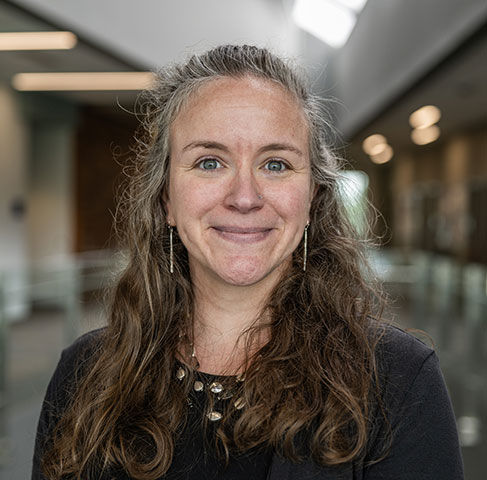
Kayti Protos, DSW, LCSW
Dr. Kayti Protos (she/her) is a licensed clinical social worker (LCSW) in Pennsylvania and Connecticut, with over 15 years of clinical experience working with and advocating on behalf of the LGBTQQIA+ community. Dr. Protos is a doctor of social work (DSW), completing her degree at Rutgers School of Social Work with a focus on the intersectional experience of transgender and nonbinary clients navigating eating disorder(s), identity-based trauma, and gender dysphoria. She received her master of social work from Tennessee State University and her bachelor’s degree in women’s and gender studies and communication studies from Vanderbilt University. Additionally Dr. Protos has presented at over 75 professional conferences or invited lectures, and is the co-author of A clinician’s guide to gender identity and body image: Practical support for working with transgender and nonbinary clients.
Meet our Director of Field Education
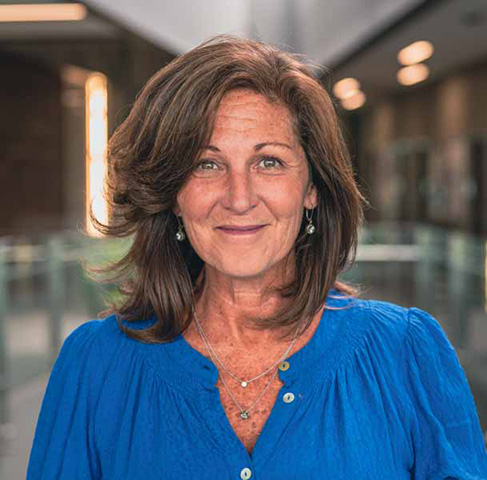
Michelle Brandt, MSW, LSW
Michelle Brandt (she/her) is an assistant clinical professor and director of field education in the MSW program. She spent more than 20 years working as a social worker in the health care field with a focus on adults and older adults, hospice, palliative care, and oncology and has 10 years’ experience in social work field education. A strong connection to social work values and ethics informs Michelle’s approach to practice and teaching and a commitment to the social work profession has led to her interest in working with students in field education. Michelle’s research interests include ethics at end of life, grief and loss, and social work field education.
Meet our Faculty
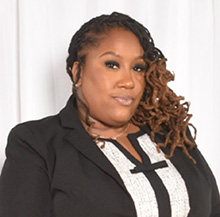
Quianna Daniels-Smart, PhD, LSW
Dr. Quianna Daniels-Smart (she/her) is a professor of graduate social work at Moravian University. She earned her PhD from Sacred Heart University, where she was honored with the Equity Activist Award and the Transformative Scholarship and Pedagogy Award.
In her work, Dr. Daniels-Smart focuses on examining faculty development practices that better support student retention, specifically in the social work profession. As a licensed social worker (LSW) with over 10 years of experience, she has worked in various areas of practice, including child welfare, community mental health, private practice, and case management.
Additionally, Dr. Daniels-Smart has provided training and education to universities, organizations, and communities on a range of topics to support social workers and the communities they serve. Lastly, she is the current President-Elect of the National Association of Social Workers Pennsylvania Chapter (NASW-PA), where she has been an active member for the past eight years in various capacities.
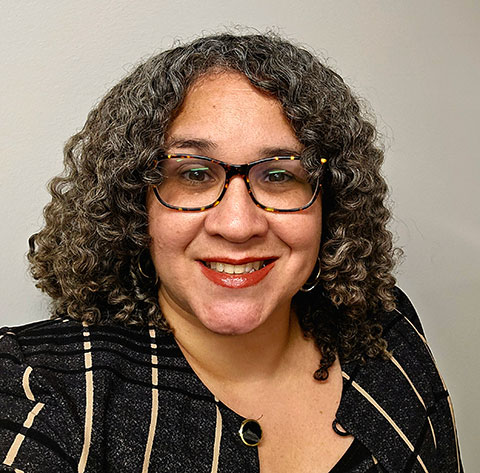
Olivia Rivera-Marmara, DSW, LCSW
Dr. Olivia Rivera-Marmara (she/her) is a licensed clinical social worker (LCSW) licensed in multiple states and has over 20 years of clinical experience working in the maternal mental health and health care field. Her clinical work focuses on working with clients experiencing perinatal mood and anxiety disorders, obsessive-compulsive disorder, and grief and loss. Dr. Rivera-Marmara is a doctor of social work (DSW), completing her degree at Rutgers School of Social Work with a focus on assessing and treating living health loss clients with chronic illness experience. She received her master of social work from The University of North Carolina at Chapel Hill and her bachelor’s degree from George Washington University. Dr. Rivera-Marmara’s research interests include health literacy, health disparities, maternal mental health, bioethics, and grief and loss.
Meet our Adjunct Faculty
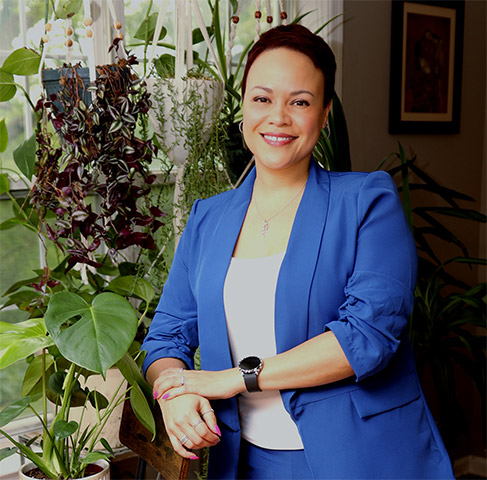
Tylynn Cofer, LCSW
Tylynn Cofer, LCSW is a licensed clinical social worker with nearly 20 years of experience providing trauma-informed, values-driven care across diverse populations and settings. She earned her Bachelor’s in Social Work from Cedar Crest College and her Master’s in Social Work from Marywood University and is licensed in Pennsylvania, New Jersey, and Virginia.
Tylynn has worked extensively in child welfare, school-based services, residential treatment, child advocacy, behavioral health, healthcare social work, and leadership as a social service manager. She is an owner of a private practice intentionally designed to center BIPOC representation, challenge mental health stigma, and actively decolonize social work and therapy. Her clinical expertise focuses on trauma, with particular attention to generational wounds and how they manifest in parenting, family systems, and identity.
Known for her unconventional and authentic approach, Tylynn creates space for clients and colleagues alike to bring their full selves. Her mission is to transform social work—challenging systems that perpetuate harm and advancing practices rooted in truth, liberation, and lasting change.
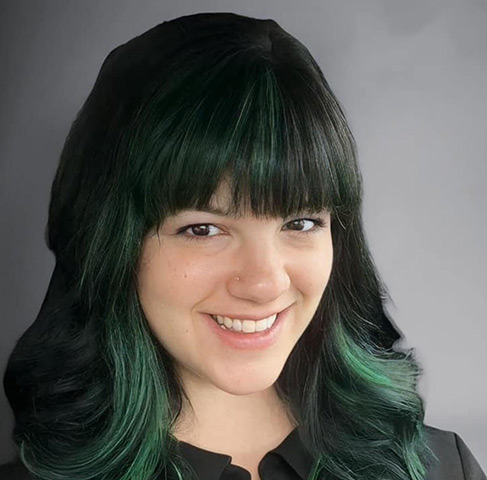
Tara Ryan-DeDominicis, DSW, LCSW
Dr. Tara Ryan-DeDominicis (she/her) is an adjunct faculty member in the Master of Social Work Program. She is a licensed clinical social worker (LCSW) in New Jersey and Connecticut, with a decade of clinical experience working with and advocating on behalf of populations experiencing street homelessness and food insecurity. She is passionate about creating programs and providing the highest level of clinical care for those who are often forgotten or ignored by their communities. In addition to her clinical work and research, she has over seven years of experience as an adjunct instructor, and served on MSW accreditation committees for two universities. Dr. Ryan is a doctor of social work (DSW), completing her degree at Rutgers School of Social Work. She received her MSW from Columbia University and her BSW from Sacred Heart University. She is currently the Education and Social Services manager at Optimus Health Care and serves on the Diversity, Equity, Inclusion and Racial Justice committee for the CT Chapter of Girl Scouts of America.
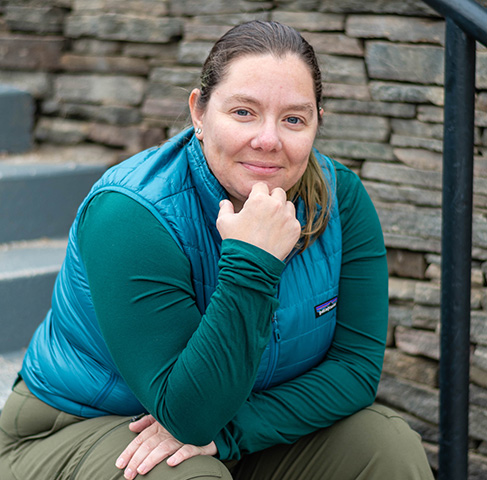
Alexandra Solomon, MSW, LCSW
Alex Solomon (they/she/zhe) is a Licensed Clinical Social Worker in Connecticut and Vermont with over 15 years experience as a social worker and over 10 years as a therapist. They hold a BSW from Skidmore College, and an MSW from the University of Connecticut with a concentration in group work and an advanced focus in mental health and substance abuse treatment. They have worked in a variety of levels of care, ranging from residential to outpatient settings, and have extensive experience working with legally involved clients and clients struggling with substance use disorders. They are currently in private practice providing therapy, supervision, and training. They are an EMDR Certified Therapist and EMDRIA (EMDR International Association) Approved Consultant, and their practice focuses on trauma and addiction, with a particular focus on complex trauma and minority stress in LGBTQ+ people and religio-cultural minority communities. Their interests include culturally competent trauma treatment, working with higher-acuity clients, gender affirming care, affirming care for clients with alternative spiritual beliefs and experiences, advocacy as a component of clinical care, and building ethical and client-centered organizational policies.

Betty Voltaire, MSW, MEd, LSW
Betty Voltaire (she/her/hers) is a Licensed Social Worker and a Doctor of Social Welfare (DSW) candidate at New York University. Born and raised in Brooklyn, NY, Betty is the proud child of Haitian immigrants. She holds a Bachelor’s degree in English from SUNY Buffalo, a Master’s of Education from Salisbury University, and a Master’s in Social Work from LIU Brooklyn. A devoted daughter to Lucien and mother to G. Lucien, Betty is passionate about reshaping social work through decolonized practices. Her mission is to ensure that vulnerable communities have a voice in the decisions that impact their lives. Betty’s professional experience spans a wide range of fields, including elder care, homelessness services for single adult men, healthcare, nonprofit work, program management, supervision, and higher education. In challenging times, Betty grounds herself in her purpose: honoring her ancestors who could never imagine such opportunities, empowering the vulnerable to dream beyond their circumstances, and paving the way for her descendants to know that nothing is beyond their reach.
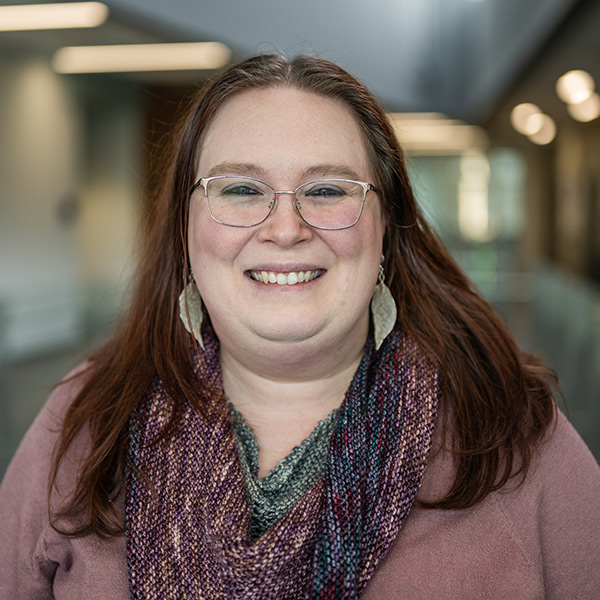
Let’s Talk
Jessica Skultety is your one-stop shop for all things School of Behavioral and Community Health related. Financial aid, admissions, student support, you name it. She'll be there to help pave the way. Schedule a meeting or connect with her via phone, text, or email.
Jessica Skultety
She/her/hers
Student Experience Mentor - Behavioral Health
(610) 625-7986
skultetyj@moravian.edu
Can I receive credit for life or work experience?
Per accreditation requirements, the MSW Program does not grant social work course credit for life or work experience. For Regular Student Admission, only credit for courses earned from a college or university accredited by a recognized regional accrediting organization, where a grade of B or better was earned will be considered for transfer credit. For Advance Standing Students, only credits earned from BSW programs accredited by CSWE, where a grade of B or better was earned will be considered for transfer.
Where is the program in the CSWE accreditation process?
Moravian's MSW Program has achieved candidacy for accreditation by the Council on Social Work Education’s (CSWE) Board of Accreditation (BOA).
Candidacy for a baccalaureate or master’s social work program by the BOA indicates that it has made progress toward meeting standards of program quality evaluated through a peer review accreditation process. A program that has attained candidacy status has demonstrated a commitment to meeting the standards set by the Educational Policy and Accreditation Standards (EPAS) but has not yet demonstrated full compliance.
Students that are admitted to candidate programs in the fall (or later) of the academic year in which the program is granted candidacy status will be retroactively recognized as graduates from a CSWE-BOA accredited program as long as the program attains initial accreditation. Candidacy is typically a 3-year process and attaining candidacy does not guarantee that a program will eventually attain initial accreditation.
Candidacy applies to all program options, which includes locations and delivery methods.
Accreditation provides reasonable assurance about the quality of the program and the competence of students graduating from the program.
Review our program’s candidacy status in CSWE’s Directory of Accredited Programs.

